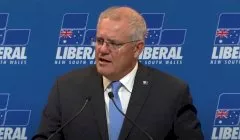Invest
Australia can get rid of coal without prices skyrocketing
Australia’s transition to renewable energy is unlikely to create unaffordable electricity prices or come at the risk to reliability, with policymakers urged to generate the majority of power from renewable sources, new research shows.
Australia can get rid of coal without prices skyrocketing
Australia’s transition to renewable energy is unlikely to create unaffordable electricity prices or come at the risk to reliability, with policymakers urged to generate the majority of power from renewable sources, new research shows.

A research paper by the Grattan Institute challenges the pro-coal politicians highlighting the ‘myth’ around the importance of coal in keeping prices low.
The paper argues that Australia’s National Electricity Market (NEM) should shut down two-thirds of coal power plants, replacing them with 70 per cent renewable energy as it is unlikely to materially increase costs for Australian households.
The economic modelling suggests that moving to a system with 90 per cent renewable energy without coal could still remain reliable, although it would see the cost of keeping the lights on increase due to the need for generation, transmission and storage for days “when the sun isn’t shining or the wind isn’t blowing”.
“Nonetheless, this would be a low-cost way to nearly eliminate emissions in the NEM, and offsetting any remaining emissions each year could well be the cheapest way to reach net zero,” lead author Tony Wood said.

The report pushes for most of Australia’s coal-fired power stations, which are due to be retired in 2040, not to be renewed or upgraded.
“Australia can achieve the trifecta of reliable, affordable, low-emissions electricity, and we can do it without coal,” Mr Wood noted.
However, Grattan’s findings warn against rushing completely to renewable energy, saying it would see prices “skyrocket for consumers” without major technological advances to back up renewable supply.
Instead, they argue Australia should commit only to “net” zero emissions in the NEM by the 2040s, not “absolute” zero emissions or 100 per cent renewable energy.
With the absence of technologies today to go completely renewable, Grattan has noted the importance of gas as a transition electricity source.
They said gas generation with negative-emissions offsets will be the lowest-cost ‘bridging’ technology until a zero-emissions alternative, such as hydrogen-fired generation, pumped hydro storage or carbon capture and storage, becomes an economically competitive backstop.
“Gas is likely to play the critical backup role, though not an expanded role. Australia will make a gas-supported transition to a net-zero emissions electricity system – but not a ‘gas-led recovery’ from the COVID recession,” Mr Wood concluded.
About the author

About the author


Commodity
Gold's remarkable surge in 2025 sets the stage for a volatile 2026
Gold has experienced a stellar year in 2025, achieving over 50 all-time highs and delivering a return exceeding 60%, making it one of the top-performing assets. This impressive performance has been ...Read more

Commodity
Scenic Eclipse launches fifth Antarctica season with new submersible, private jet transfers and helicopter experiences
Scenic Discovery Yachts has commenced its fifth Antarctica season, introducing new ultra-luxury experiences including private jet transfers, advanced helicopter excursions and a new Scenic Neptune ...Read more

Commodity
Is crypto getting the shaft for a big gold re-polish?
While the spotlight shines on trendy cryptocurrencies, investors evidently haven’t lost interest in traditional and tangible commodities like precious metals. Read more

Commodity
Morrison’s gas-led recovery sees manufacturers ‘held to ransom’ by gas cartel
Australia’s manufacturing sector and its workers are being ‘held to ransom’ by the gas cartel, despite the Morrison government promising cheap gas as a key policy in the COVID-19 recovery planRead more

Commodity
‘Investors should take note’: Gas-led recovery to lead to stranded assets
Australia’s gas-led economic recovery could be relying on inaccurate financial assumptions, new research has revealed. Read more

Commodity
Credibility up in flames as government opens 21 new gas and oil exploration sites
Climate groups are saying the Morrison government lacks any credibility when it comes to climate change after it announced 21 new gas and oil exploration areas. Read more

Commodity
Morrison urged to drop gas-led recovery after new global warning
The International Energy Agency has found that countries like Australia need to transition their energy grid within 14 years to reach net zero, defying Prime Minister Scott Morrison’s gas-led economic ...Read more

Commodity
Taxpayers to bear brunt of Morrison’s $2bn pledge to oil refineries
Taxpayers are set to be on the hook for up to $2 billion over the next decade as the government commits to protecting two oil refineries. Read more

Commodity
Gold's remarkable surge in 2025 sets the stage for a volatile 2026
Gold has experienced a stellar year in 2025, achieving over 50 all-time highs and delivering a return exceeding 60%, making it one of the top-performing assets. This impressive performance has been ...Read more

Commodity
Scenic Eclipse launches fifth Antarctica season with new submersible, private jet transfers and helicopter experiences
Scenic Discovery Yachts has commenced its fifth Antarctica season, introducing new ultra-luxury experiences including private jet transfers, advanced helicopter excursions and a new Scenic Neptune ...Read more

Commodity
Is crypto getting the shaft for a big gold re-polish?
While the spotlight shines on trendy cryptocurrencies, investors evidently haven’t lost interest in traditional and tangible commodities like precious metals. Read more

Commodity
Morrison’s gas-led recovery sees manufacturers ‘held to ransom’ by gas cartel
Australia’s manufacturing sector and its workers are being ‘held to ransom’ by the gas cartel, despite the Morrison government promising cheap gas as a key policy in the COVID-19 recovery planRead more

Commodity
‘Investors should take note’: Gas-led recovery to lead to stranded assets
Australia’s gas-led economic recovery could be relying on inaccurate financial assumptions, new research has revealed. Read more

Commodity
Credibility up in flames as government opens 21 new gas and oil exploration sites
Climate groups are saying the Morrison government lacks any credibility when it comes to climate change after it announced 21 new gas and oil exploration areas. Read more

Commodity
Morrison urged to drop gas-led recovery after new global warning
The International Energy Agency has found that countries like Australia need to transition their energy grid within 14 years to reach net zero, defying Prime Minister Scott Morrison’s gas-led economic ...Read more

Commodity
Taxpayers to bear brunt of Morrison’s $2bn pledge to oil refineries
Taxpayers are set to be on the hook for up to $2 billion over the next decade as the government commits to protecting two oil refineries. Read more









